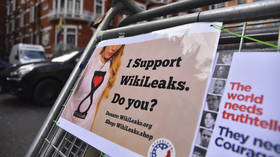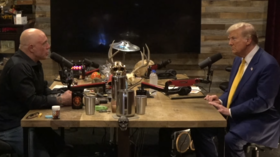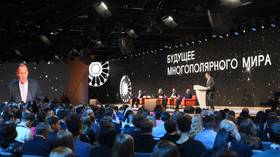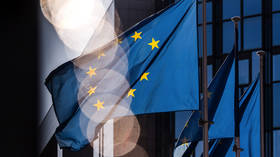WikiLeaks hits $50,000 in donations, enough to start suing Guardian over Assange-Manafort ‘scoop’

WikiLeaks says it has collected enough funds to file a lawsuit against the Guardian for publishing an uncorroborated story about alleged meetings between former Trump campaign manager Paul Manafort and Julian Assange.
The whistleblowing website has thanked all its supporters who contributed to its GoFundMe campaign, launched on November 27 following the publication of an article by the Guardian, which claimed that US President Donald Trump’s disgraced former campaign manager Paul Manafort had held secret talks with Julian Assange at least three times in the Ecuadorean embassy in London, where the Australian has been holed up since 2012.
The donations have recently hit the $50,000 threshold, enabling the whistleblowing site to formally launch proceedings against the renowned British newspaper, WikiLeaks said, calling on its supporters to keep the money flowing.
“Legal action will now commence (but more is required to complete),” it tweeted on Monday.
WikiLeaks fund to sue the Guardian for publishing fabricated front page stories has hit $50,000. Thanks to all 1270 donors so far. Legal action will now commence (but more is required to complete). https://t.co/VaoMESN5RO
— WikiLeaks (@wikileaks) January 14, 2019
When it launched the campaign, WikiLeaks set up the ambitious target of $300,000. It has so far raised $51,749.
WikiLeaks seeks to challenge the Guardian in court over its source-based ‘bombshell,’ co-authored by its former Moscow correspondent Luke Harding, alleging that Manafort had traveled to London three times over four years prior to the publication of the Democratic National Committee (DNC) email leaks.
The report relies on Ecuadorean intelligence sources and documents provided to the Guardian by the country’s intelligence agency. In its GoFundMe appeal, WikiLeaks suggested that the intelligence agency might have deliberately fed the British publication false information, which it was happy to take at a face value.
WikiLeaks also noted that it was not the first time the Guardian put out a false story about Assange.
The initial report was refuted by both WikiLeaks and Manafort, who called it “totally false and deliberately libelous.” While no other outlet has confirmed the Guardian’s report, the Washington Times reported that stamps in all three of Manafort’s passports indicate that he visited England only twice, in 2012 and either 2010 or 2016, with the latter marking not clear.
The Guardian alleged that the ‘meetings’ it refers to took place in 2013, 2015 and 2016.
Also on rt.com ‘Fake story’: Ecuadorean diplomat blasts Guardian’s Assange-Manafort meeting reportThe story has also been dismissed as “fake” by former senior diplomat at the London embassy Fidel Narváez, who worked as Ecuador’s first secretary and a counsel from 2010 to July 2018. The diplomat, who now resides in London, said that there were no meetings between Assange and Manafort on his watch. He argued that it was practically “impossible” to enter the embassy without being noticed, considering it is surveilled 24/7. Moreover, a visitor would have needed to receive a permit from the ambassador and security personnel, which cannot be done without leaving some kind of record in the embassy’s logs.
Despite a storm of criticism led by ex-Guardian writer and now co-editor at the Intercept, Glenn Greenwald, the Guardian refused to retract the story, but included the denials by Manafort and WikiLeaks.
Think your friends would be interested? Share this story!














